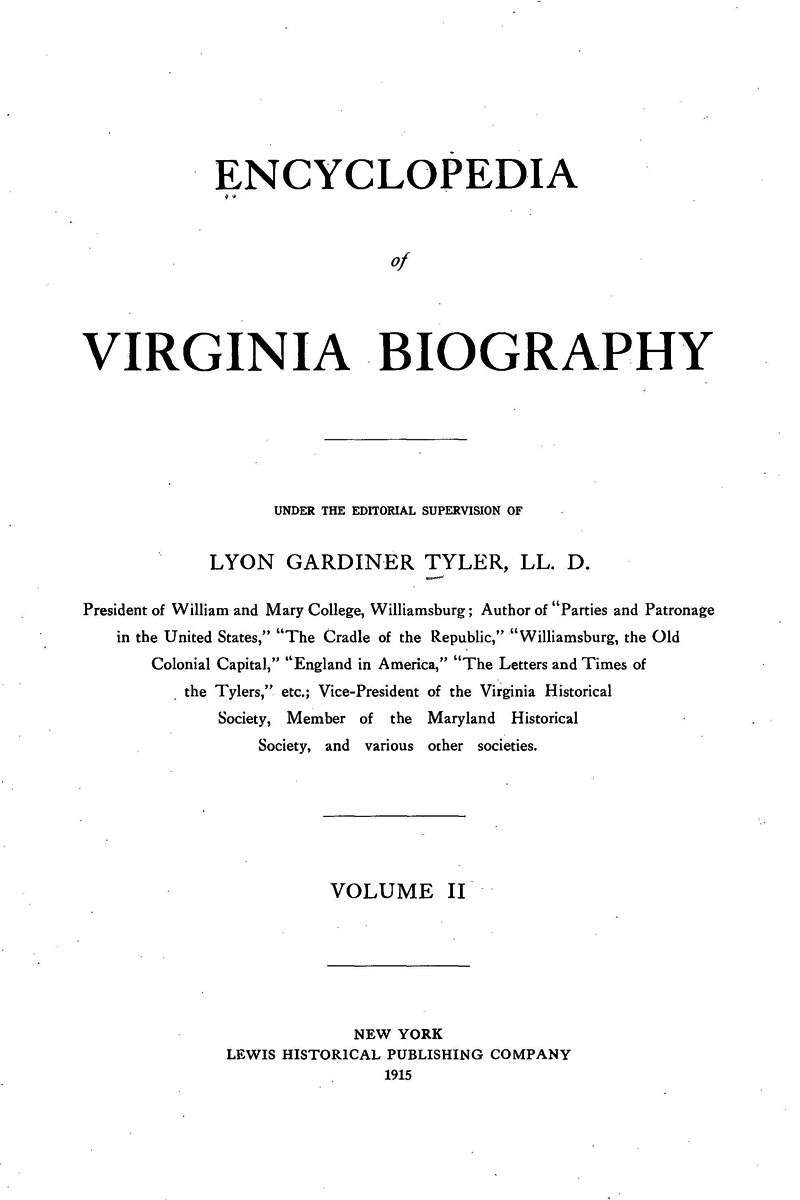Encyclopedia of Virginia Biography

Lyon Gardiner Tyler, Sr. (1853 – 1935) was an American historian and educator, founder of William and Mary College Quarterly Historical Magazine, and the 17th president of the College of William & Mary. A brief but excellent biography of George Wythe appears in Tyler's series, the Encyclopedia of Virginia Biography.[1] It omits errors made in previous biographies which fail to account for Wythe's work as a country lawyer before his practice in Williamsburg, and provides a good timeline of the offices Wythe held, and events in his life.
The set also provides a brief biography of Wythe's father, Thomas Wythe III:[2]
Wythe, Thomas, was the son of Thomas Wythe, of Elizabeth City county, and Anne Shepard, his wife, daughter of John Shepard. He was a justice of the peace and was a burgess of Elizabeth City county from 1718 to 1726. He married Margaret Walker, daughter of George Walker, in 1720, and was the father of the celebrated George Wythe, one of the patriots of the revolution.[3]
Article text, 1915
Wythe, George, son of Thomas Wythe, and Elizabeth Walker, his wife, who was a granddaughter of the celebrated Rev. George Keith, of England and Pennsylvania, was descended from Thomas Wythe, who came to Elizabeth City county, from England about 1680. He was born in 1726, was schooled under the care of his mother, who was well educated, and attended William and Mary College. He studied law under his uncle-in-law, Stephen Dewey, in Prince George county; settled in Williamsburg, and attained distinction at the bar, and was made attorney-general by Governor Dinwiddie, in 1754, in the absence of Peyton Randolph; was burgess for the city of Williamsburg, August of the same year, on the death of Armistead Burwell, continuing till 1756. About this time he removed to Spotsylvania county, where he married Anne, daughter of Zachary Lewis, a prominent lawyer there. In 1758 he was again in Williamsburg, and was burgess for the college of William and Mary in the assembly of 1758-1761, after which he removed to his native county, Elizabeth City, and was burgess for that county from 1761 to 1769, when he was made clerk of the house of burgesses, an office retained by him till 1775. During the Stamp Act troubles, he was one of the committee of correspondence, which in June, 1764, protested against its enactment, and he drew the remonstrance to the house of commons adopted by the burgesses in December, 1764. He opposed the resolutions of Patrick Henry in May, 1765, as hasty and premature. He served as clerk of the house of burgesses till he was appointed a member of Congress in August, 1775, where he supported the resolutions of Richard Henry Lee, in favor of independence, and afterward was a signer of the Declaration of Independence. In 1776 he was appointed a member of the committee to revise the laws of the state and to adapt them to the new form of government, having been one of the compilers of the Code of 1769. In 1777 he was speaker of the house of delegates, and the same year was appointed one of the three judges of the chancery court established by law. While holding this position, he was appointed, in 1779, professor of law at William and Mary College, being thus the first professor of law in the United States. As a part of his methods of teaching he held moot law courts and legislative assemblies in the old Williamsburg capital. He was the first judge to announce the power of the courts to over-rule an unconstitutional enactment. In 1789 he was made sole chancellor of the state, resigned his professorship, and went to reside in Richmond. In 1787, he represented Virginia in the Federal convention at Philadelphia and in 1788 was vice-president of the Virginia state convention, which ratified its work, Mr. Wythe voting for the constitution. He was twice presidential elector on the Republican ticket. The honorary degree of LL. D. was conferred upon him by William and Mary in 1790. So just and upright was he in his decisions, that he was called the "American Aristides," and both Thomas Jefferson and John Marshall studied law under him. The former pronounced him "one of the greatest men of his age." He was the author of "Decisions in Virginia by the High Court of Chancery." He died from the effects of poison, and his great-nephew, George Wythe Sweeney, was tried for the crime, but was acquitted. He died June 8, 1806, and was buried in St. John's churchyard, Richmond. He married (second) Elizabeth Taliaferro, daughter of Richard Taliaferro, of James City county, but he had no surviving issue by either of his wives.
See also
- Ancestry of George Wythe, LL.D.
- Catalogue of the College of William and Mary in Virginia
- Great American Lawyers
- History of Hampton and Elizabeth City County Virginia
- Remonstrance to the House of Commons
References
- ↑ Lyon Gardiner Tyler, ed., Encyclopedia of Virginia Biography, vol. 2 (New York: Lewis Historical Publishing Co., 1915), 40-41.
- ↑ Tyler, "Ancestry of George Wythe, LL. D.," William and Mary College Quarterly 2, no. 1 (July 1893), 69.
- ↑ Tyler, Encyclopedia of Virginia Biography, vol. 1, 365.
External links
- Read this article in the Internet Archive.